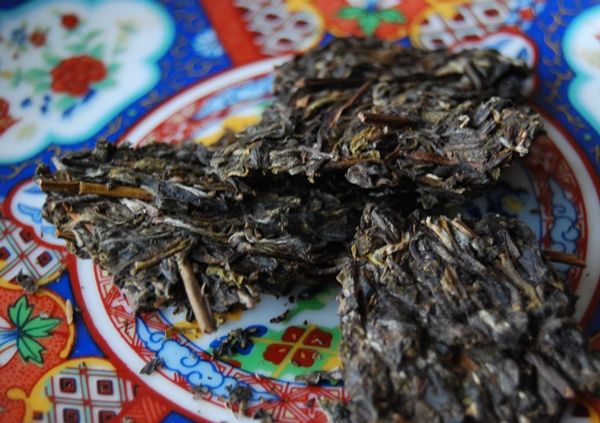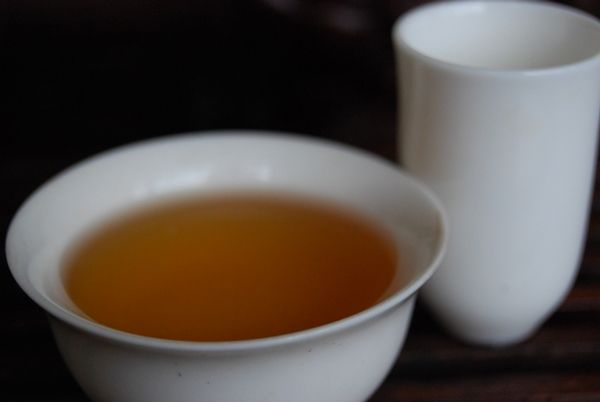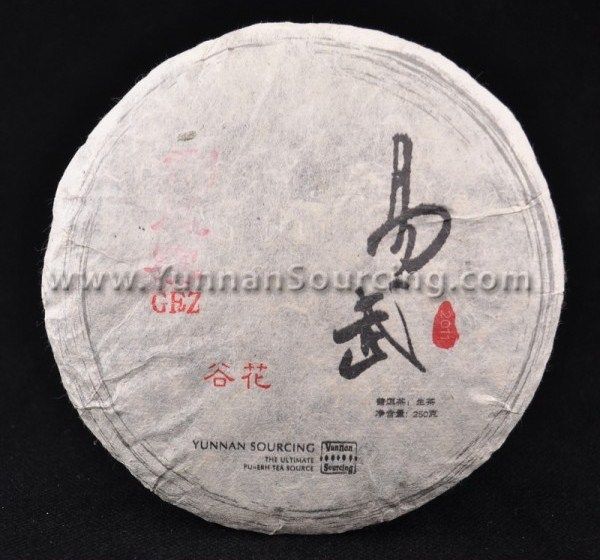Look upon my Guafengzhai, ye mighty, and despair.
All the best tea comes in little air-sealed bags. It's what the emperor would have wanted.
If ever there were a rival to the all-dominating presence of Laobanzhang, in the wide world of pu'ercha, then surely Guafengzhai must be it. Never has so much been paid for so little by so many.
The reason for this is, of course, that Guafengzhai can be absolutely lovely. There is a sublime character to a true laoshu Laobhanzhang; I've not had many, but I've had enough to cause me to weep every time a mainstream label tries to sell something that claims to be a "Laobanzhang" cake. Likewise, good Guafengzhai is hard to find.
Scott's cakes from Yunnan Sourcing are often very reliable, although I don't recall have a Guafengzhai from him since the 2009 version (back in the days of colourful wrappers). I enjoyed that cake more than the rest of the 2009 series.
Decent, medium-sized leaves
This cake is, however, an autumnal cake, which might count as being a bit of a shame (because we can expect less potency and character than the springtime versions), but might also be an opportunity to have a decent cake for the typically lower prices of autumnal cakes. In this case, the price is $36 / 250g, which is reasonable - perhaps on the borderline of being pricey. 250g makes this a xiaobing, of sorts, whereas a full bing equivalent would cost around $54.
Scott is usually very fair with his prices, and the fact that this cake is priced less expensively than his 2011 Xikong and 2011 Yibang autumnal cakes suggests something to us.
This depth of colour is due to the air - it is otherwise yellow and pure
The medium-sized leaves have a richly sweet aroma that gets my hopes up, right from the start. As ever, the opening infusion is a marvellous complex of characteristics; here, we have a heavy base of grain, plenty of Yiwu sweetness, and a solidity of texture. As Scott's notes suggest, there are hints of wildflowers in the aroma after the swallow. The question is whether or not subsequent infusions can live up to this first-infusion beauty.
I miss the days of colourful wrappers...
Sadly, these charms fade into the background in the next few infusions. We are left with a base of clean, solid Yiwu with decent strength and that pleasant granary base. I initially thought that it would be worth buying a single cake, just for future reference, but later talked myself out of even that humble purchase. It is a reliable and pleasant cake, but it cannot scale the heights of springtime Guafengzhai...





10 comments:
Have you ever tried any pu-erh from this company? (Longhui?) (http://www.kungfutea.co.uk/teas.php)
Hello Hobbes
I would like to send you an email but I don't find your contact adress. I am Philippe of the french blog "La Galette de Thé" : http://g2t-archives.blogspot.fr/
Could you please contact me because I would like to ask you something. Here is my adress : galethe@gmail.com
Thanks.
Kind regards,
Philippe
Dear Tea Fanatic,
I haven't ever tried the output from that factory - is it any good? :)
Dear Philippe,
E-mail sent!
Toodlepip,
Hobbes
Ive been experiencing repeatedly with many samples the second infusion disappointment, I think this might be that the gushu leaves are blended, simply they draw back, they are so subtle that they are suppressed by the taste of the the blended leaves, I dont think the price of 36 bucks for pure gushu is that much, until is pure :-)
Dear Pu-erh.sk,
It might also be that the first infusions have a set of compounds that rapidly diminish with respect to the underlying content of the leaves, which becomes dominant in later infusions; the small structures of the light aromatics may be quickest to exit the leaf in solution, while the heavier, more robust compounds that deliver the majority character in later infusions may take longer to exit the leaf.
Either way, the first one or two infusions can often be unrepresentative!
Toodlepip,
Hobbes
hi hobbes, send me your postal address, id like to send you a sample of GFZ2009, ill be curious what how you will comment it, Peter, peter@pu-erh.sk
E-mail sent :)
I bought one of Yunnan Sourcing's 2010 GuaFengZhai spring bricks (which sold out..I actually bought the last 3 bricks he had in stock) it was absolutely amazing. However it has to be the most difficult tea to brew that I currently have in my collection. If I got temp/timing right I got a sweet buttery brew if I didn't it tasted like I just brewed dried lawn clippings.
The brewing parameters seem to be extremely tight on this one.
I think the extremely dry humidity (15% - 30% humidity) here in Denver has also had a disastrous effect on the storage of this particular tea. I have been unable to get a good brew after a year of storage. I am hoping that leaving the undisturbed bricks alone for a few more years might prove me wrong. I haven't tried his Autumn but I hope he has a 2012 Spring GuaFengZhai. I will surely buy one.
Dear James,
I've not heard of the Guafengzhai bricks, but it sounds good to me! I can imagine that something with highly dense compression might be more tricky to brew - I often find myself overbrewing teas which are young and highly compressed. I'm now of the opinion that it is better to start with too few leaves in the pot, and add some if necessary, rather than make something which is too brutal from the outset. :)
What Denver lacks in humidity, it gains in beauty! Colorado has to be one of the most stunning places on earth. Just buy your tea when you're ready to drink it, perhaps, rather than storing it yourself, and congratulate yourself in living in a place that so many of us look upon in awe!
Toodlepip,
Hobbes
hmmm.. never thought of it that way. But I did move here just because I was tired of looking at cornfields in Nebraska.. I suppose I should count my blessings and keep your advice and buy tea new.. keep storage lean.
Good advise I will stick to it. Thanks again for the frequent tea insights..
Post a Comment